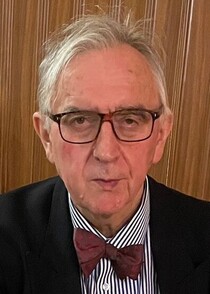Events
Mar 01, 2023
Seminar (2023-03-01)
School of Biomedical Sciences is pleased to invite you to join the following seminar:
Date: 1 March 2023 (Wednesday)
Time: 4:00 pm - 5:30 pm
Venue: Lecture Theatre 1, G/F, William M.W. Mong Block, 21 Sassoon Road
Speaker: Professor Ermanno Gherardi, Director, Department of Molecular Medicine, University of Pavia
Talk Title: Cell migration in development and cancer
Biography

Professor Gherardi studied Classics and Medicine at Collegio S Carlo in Modena (Italy) (1966-1971 and 1971-1977) and did the research for my PhD in Biochemistry and Molecular Biology at Corpus Christi College at Cambridge University (1982-1987). He worked as a postdoctoral fellow with Michael Stoker and Cesar Milstein, the discoverer of monoclonal antibodies at the MRC Laboratory of Molecular Biology in Cambridge (1987-1991). His own research group at the MRC Laboratory of Molecular Biology focused throughout the years on antibody engineering - and specifically on the development of the phage antibody technology and new technologies for engineering antibody affinity - and on growth factors, in particular HGF/SF a protein discovered independently as a factor controlling cell movement and epithelial-mesenchymal transition (scatter factor) and as a mitogen for liver cells (hepatocyte growth factor). They studied over the years the structure of HGF/SF, its role in development and cancer and the prospects of harnessing the properties of this molecule in regenerative medicine. In 2012, he moved from Cambridge to the University of Pavia (Italy) to take up the Camillo Golgi chair of Immunology and General Pathology.
Abstract
Cell migration is fundamental for embryogenesis, tissue repair and regeneration. The movement of animal cells throughout development and regeneration is highly controlled and involves processes in which cells move either as entire sheets (collective migration) or individually (amoeboid or mesenchymal migration). Classical studies by Michael Abercrombie demonstrated that the movement of cancer cells differs in fundamental ways from the movement of normal cells and identified in the 'loss of contact inhibition of cell movement' a quintessential property of cancer cells. The abnormal movement of cancer cells enables them to migrate at a distance from the primary tumour and give raise to secondary tumours. This process, known as metastasis, is the prime cause of cancer deaths. In my seminar I will discuss how cancer cells highjack mechanisms typical of embryonic cells in order to initiate metastasis and migrate across the body. I will focus specifically on 'epithelial mesenchymal transition', a powerful mechanism that releases individual epithelial cancer cells from neighbour cancer cells unleashing their potential to metastasise and give raise to secondary tumours. These studies open new avenues for the development of small molecules and antibodies targeting metastasis, an essential step for cancer therapy.
ALL ARE WELCOME
Should you have any enquiries, please feel free to contact Miss Angela Wong at 3917 9216.

